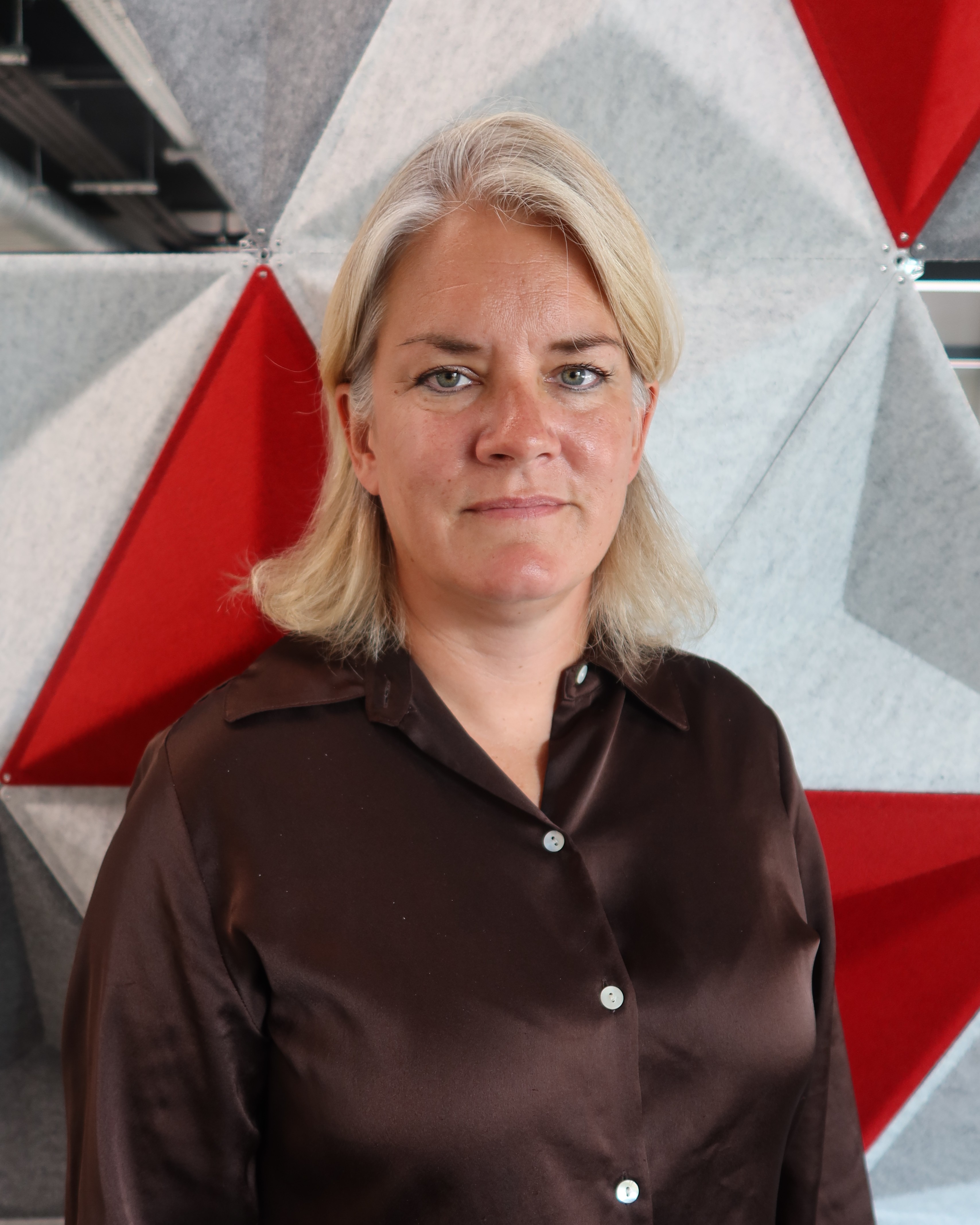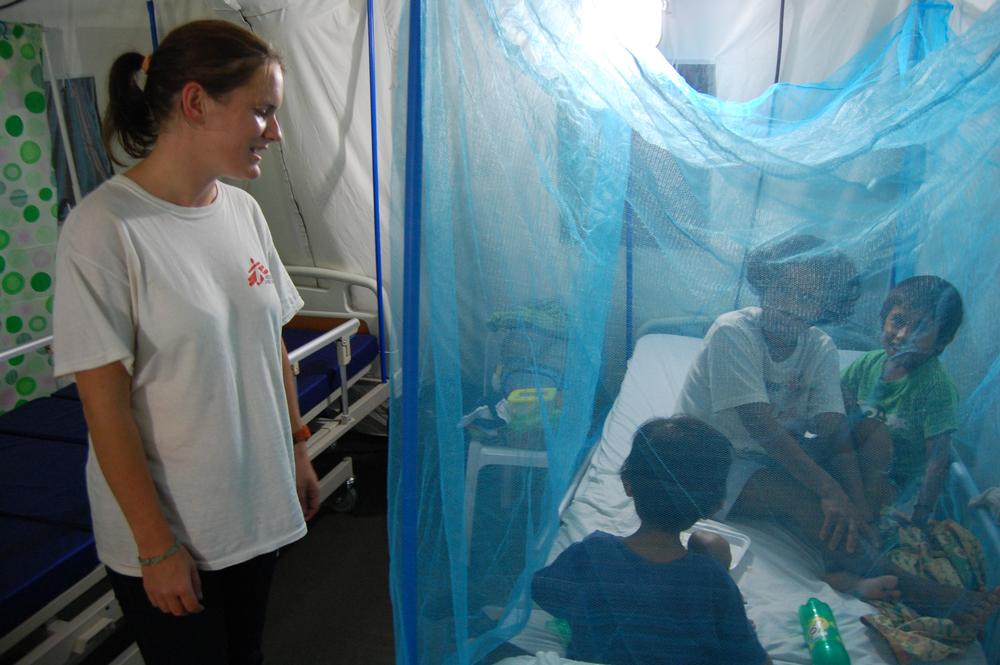Meet our Executive Team
Biographies of the MSF UK senior leadership team, including our Executive Director, Dr Natalie Roberts.
Natalie Roberts - Executive Director
Dr Natalie Roberts is the Executive Director of Médecins Sans Frontières / Doctors Without Borders (MSF) in the UK.
A British emergency doctor, Natalie joined MSF in 2012 and subsequently held emergency coordination roles in zones of conflict and crisis across Africa, Asia and the Middle East, including in Syria, Yemen, Ukraine, Pakistan, the Philippines, Ethiopia and the Central African Republic.
In 2016, she became Head of Emergency Operations for MSF in Paris, overseeing MSF’s emergency response programmes worldwide. Before she took up her current role, she was Director of Studies for Crash, an MSF think tank in Paris.
Natalie holds a medical degree from Cambridge University and Imperial College London, a diploma in tropical medicine from Liverpool School of Tropical Medicine, and an MSc in the political economy of violence, conflict and development from SOAS.
Dr Natalie Roberts became Executive Director of Médecins Sans Frontières / Doctors Without Borders (MSF) UK in October 2022, succeeding Vickie Hawkins.
"Before I went to medical school, I sheltered ambitions to work for MSF – in fact, it was one of the reasons I wanted to become a doctor in the first place.
However, after six years of medical school (and six years of student loans) I went straight into working for the NHS, initially training in reconstructive surgery before moving into emergency medicine.
UK doctor
The long hours and roving lifestyle involved in being a UK hospital doctor meant that I put all thoughts of working overseas out of my mind until the 2010 Haiti earthquake and subsequent cholera epidemic reminded me of my original ambition to work with MSF.
Those eight years of experience in the NHS did me no harm. In 2011, when I finally did apply to MSF UK, I was accepted immediately based on my experience.
The training, knowledge, and team-management skills I gained working in different NHS hospitals continue to be useful in my day-to-day work, despite moving away from clinical practice.
I went on my first MSF assignment – an emergency response to a typhoon in the Philippines – at the beginning of 2012, fully intending to return to the NHS within the year. But I never did.
I’ve had an interesting, if unplanned, career with MSF since then.
Listen to a special interview with Natalie on the BBC's daily news podcast, Newscast
Correction: Natalie references an airstrike in Gaza in which an MSF colleague was killed. Five people lost their lives, not eight, as originally stated.
Emergency response
After a couple of months in the Philippines, I spent nearly four years in back-to-back emergency response assignments as a member of the MSF emergency team in Paris, mainly working in different situations of war and violence: Aleppo, Syria; east Ukraine; Central African Republic and north Yemen.
I moved quite quickly away from clinical work into operational management as an emergency coordinator, but I always tried to retain that medical perspective, aiming to ensure that our activities were always somehow contributing to tangible impact for the people that we were trying to assist.
I think it was during those initial years, working in the most challenging circumstances with a wide range of colleagues from around the world, that I really understood what MSF could achieve.
Operational management
After studying for a master’s degree in the political economy of violence and conflict, while also working in the MSF UK office on advocacy for refugees and migrants, I returned to operational management.
I was the head of emergency programmes for MSF in Paris, involved in responding to nutrition crises in Nigeria and Chad, conflict in Syria, Yemen, and Iraq, outbreaks of Ebola, cholera and measles across the world, and supporting refugees and displaced people in Bangladesh and the Democratic Republic of Congo.
Reflection and analysis
I have most recently been working with the Crash (Centre de Réflexion sur l'Action et les Savoirs Humanitaires), an MSF thinktank that reflects on the practices of the organisation, with the aim of supporting MSF teams to also reflect upon, and therefore improve, their actions.
When I think back now to my teenage visions of what working for MSF would be like, you could say that I am now very far from there – I certainly didn’t expect to be spending my days sitting in front of a computer in London.
But at the same time, I’m exactly where I wanted to be – involved in the most exciting, and most challenging, medical work possible.
MSF UK makes such important and diverse contributions to our association, so it’s really exciting to be here."
Matthew Coldiron – Manson Unit Director
Matthew Coldiron (Matt) is Director of the Manson Unit at MSF UK and Deputy Medical Director of MSF-Operational Centre Amsterdam (OCA).
After completing a BA at Princeton, he received MD and MPH degrees from Emory University and completed postgraduate medical training in internal medicine at NYU- Bellevue Hospital in New York.
He has worked extensively in humanitarian contexts with MSF since 2010, providing medical care and leadership in MSF projects, and designing and leading observational studies and clinical trials.
His areas of expertise include meningococcal meningitis and malaria in the African Sahel, the treatment of snakebite in resource-limited settings and emerging infections.
Judith Escribano – Communications Director
Judith Escribano (Jude) is the Director of Communications at MSF UK. The communications department contains four teams, focusing on media, digital, brand and content, and public engagement and internal comms. She also works with the Committee of Comms Directors (DirCom) across the MSF movement.
Judith has over 30 years of experience working on international development, humanitarian relief and human rights. She started her career at the Central America Human Rights Committee and co-founded a charity supporting refugees returning from Guatemala after the end of the civil war. She then worked at Christian Aid, Help the Aged, Age International, ActionAid International, Islamic Relief UK and Action Against Hunger.
Judith has a BA in Spanish Language and Literature from the University of Durham and an MA in Latin American Politics from the Institute of Latin American Studies.
Alan Gosschalk – Fundraising Director
Alan Gosschalk is the Director of Fundraising at MSF UK. He has over 25 years of experience as a fundraising director in charities operating overseas and in the UK.
The fundraising department contains four teams focusing on individual giving, philanthropy, community and commercial partnerships and fundraising operations. He also works with the other fundraising directors across the MSF movement.
Alan has been a permanent fundraising director at Plan International UK, Scope, Shelter and RNID. He has also done interim assignments at charities such as ActionAid UK and Comic Relief.
He joined MSF UK in 2024.
Ahsan Hafeez – Programmes Director
Ahsan Hafeez Abbasi is Director of Programmes at MSF UK. He has more than 17 years of experience across the globe, including in Kyrgyzstan, Nigeria, Pakistan, South Sudan, Sudan, Swaziland and Uganda. Before taking his current role, he led MSF UK’s humanitarian, advocacy, analysis, representation and policy department for over a year.
His portfolio includes the educational programme LEAP (Leadership Education Academic Partnership) and GHHM (Global Health and Humanitarian Medicine). He also oversees the management of the UK's migration programme and partnership support to MSF Ubuntu.
Ahsan has also worked with ICRC as a logistician. His work experience is complemented by a Master's in Humanitarian Practices from the University of Manchester and a degree in computer science.
Kristen Veblen McArthur – Deputy Executive Director
Kristen has been MSF UK's Deputy Executive Director since 2022, taking responsibility for our executive office, people, finance and services departments.
Following a period in academia focusing on medical law and ethics and after working for the UK's Human Fertilisation and Embryology Authority, Kristen managed regulatory policy for the UK's General Medical Council (GMC).
After joining MSF UK in 2017, she became Head of the Executive Office, strengthening central governance functions, managing our grant-giving relationships with MSF's operational centres and maturing the organisation's approaches to policy, risk, planning, and data protection.
She has led MSF UK's work to implement safeguarding procedures, reduce our office carbon footprint and make MSF UK a more equitable, diverse and inclusive place to work.
Greg Moores – People Director
Greg Moores is Director of People for MSF UK and MSF Ireland. At MSF, the people department includes teams focusing on employee relations, recruitment and training, and organisational development.
Prior to joining MSF, Greg worked at director level in HR roles within the UK National Health Service (NHS) for 14 years.
Greg is a chartered fellow of the CIPD and holds a Master's Degree in Strategic Human Resource Management. He is passionate about staff experience, talent development and organisational culture.
Outside of work, Greg lives in East London, loves music, has two children, and is a lifelong supporter of Manchester City FC.
Isabel Simpson – Executive Director of MSF Ireland
Isabel Simpson is MSF Ireland’s Executive Director. She has a professional background in nursing and over 25 years of experience in humanitarian work.
Isabel first worked with MSF as medical coordinator in Bosnia in 1996 and since then has held many senior positions, including as head of MSF in Iraq, Pakistan, Somaliland, Sri Lanka, and Zimbabwe and as a project coordinator in north-east India. Isabel has also worked as Executive Director of Programmes with MSF Australia.
Isabel has also worked as an independent humanitarian consultant, specialising in exploratory and start-up missions for other international emergency and development organisations working in places such as Bangladesh, Chechnya, Iraq, the Occupied Palestinian Territories and Myanmar.
Chris Young – Finance and Services Director
Chris Young is the Director of Finance and Services.
His department consists of teams focusing on finance, IT and workplace services.
Chris qualified as a chartered accountant with the Institute of Chartered Accountants in England and Wales (ICAEW) in 2006. Since qualifying, Chris has gained significant experience in financial management and leadership in the UK not-for-profit sector.
Chris has held director of finance positions at Frontline, South Quay College and City Gateway.

